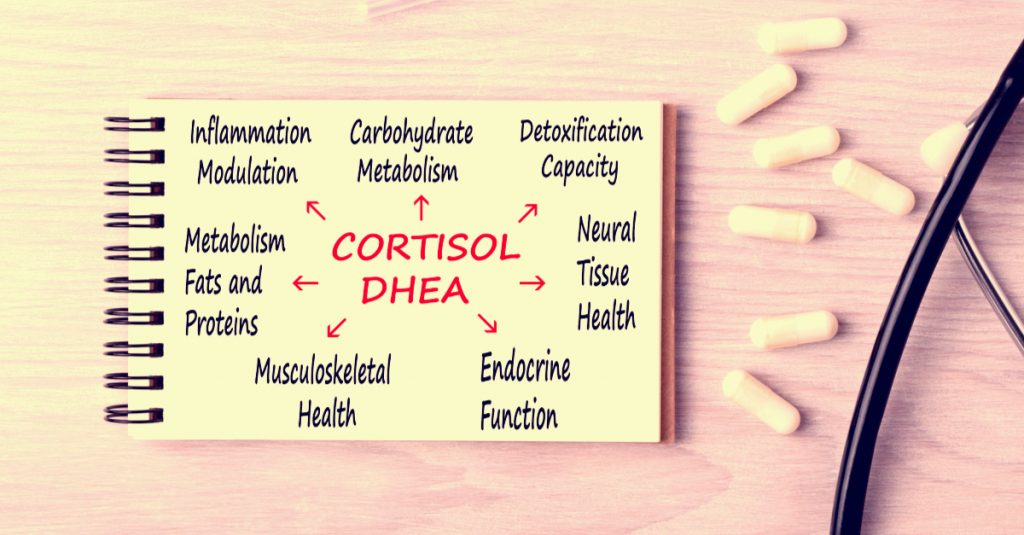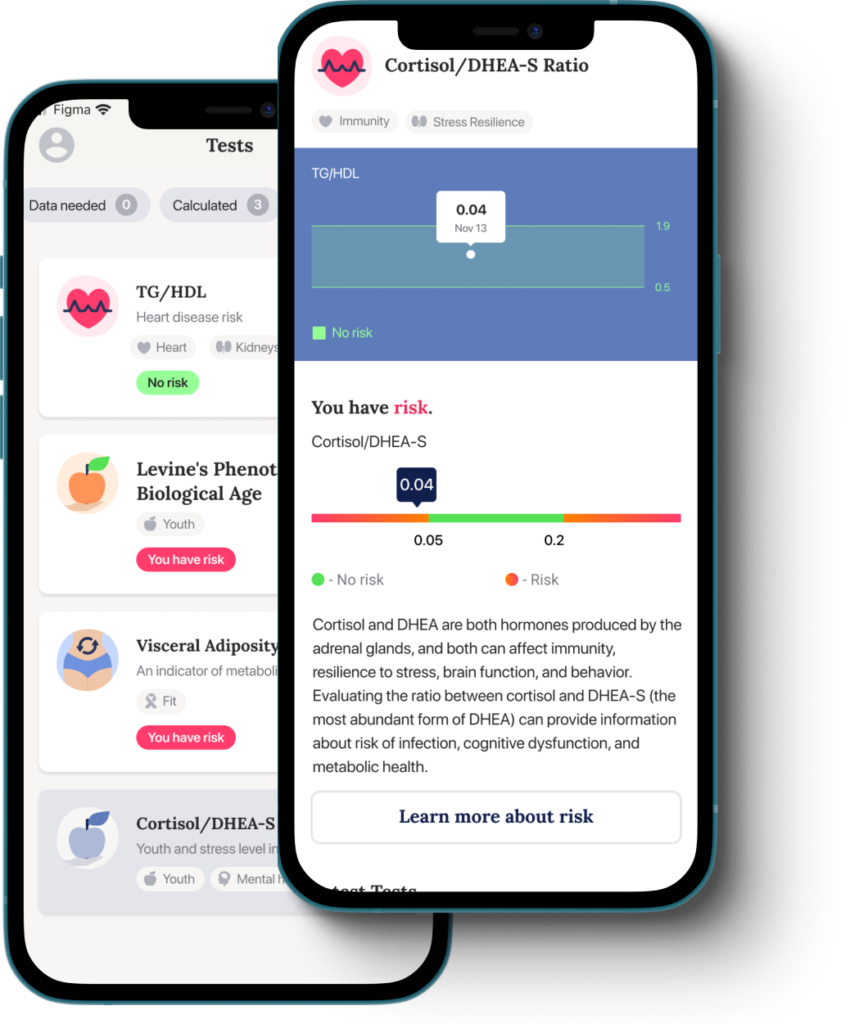Cortisol/Dhea-S Ratio Of Longevity

A complex interaction between cortisol and dehydroepiandrosterone-sulphate (DHEA-S) is crucial in the stress system balance. In particular, significantly higher or lower cortisol/DHEA(S) ratios have been associated with depression1 and aggression2. In general, DHEA-S levels affect various body systems, as well as prevent aging (Chahal and Drake 2007). That is why the Cortisol DHEA ratio is a very informational indicator, which, along with other indicators calculated in Healsens, provides important information about human health. Thus, using the ratio of cortisol / DHEA-S, you can assess body responses to exercise or evaluate mental health. Another benefit is that you can check your cortisol and DHEA-S levels at home.
This article was last reviewed by Svetlana Baloban, Healsens, on January 24, 2020. This article was last modified on 4 March 2021.
How Cortisol and DHEA Sulfate Affect the Body
Let’s start by looking at how cortisol and DHEA-S affect overall health. Dehydroepiandrosterone (DHEA) and cortisol are produced in the adrenal glands and are both derived from pregnenolone. So, DHEA and DHEA-S production reaches its peak at the age of 20–30 and then declines progressively with age. When it comes to cortisol levels, while some studies show that cortisol increases with age3, others do not support this observation4. However, everyone agrees that the reduction in DHEA-S entails disruption of various physiological systems.
Stress Level
As mentioned above, DHEA and DHEA-S play a protective role during acute stress as an antagonist to the action of the stress hormone cortisol56. In turn, cortisol also helps to effectively manage stress. Let’s see how this happens.
About 15 minutes after a stressful situation, cortisol levels rise and remain elevated for several hours. This marks the onset of stage 1. During this stage, there are elevations in cortisol with no corresponding changes in DHEA. Subsequently, glucose is mobilized, non-essential organ systems are suppressed, and inflammation is reduced. All of these physiological responses collectively enable the body to effectively cope with stress.
However, in cases of chronic stress, this adaptive reaction can take a catastrophic turn: cortisol loses its ability to function normally. This transition ushers in stage 2. In this latter stage, the persistence of stress leads to a sustained peak in cortisol levels, matched by a corresponding elevation of DHEA.
RELATED ARTICLES
It becomes increasingly challenging to maintain appropriate blood sugar levels, to allow for adequate rest, to achieve high-quality sleep, and to achieve a harmonious balance among other hormones. This signals the arrival of stage 3, wherein stress persists and becomes chronic. During this stage, cortisol levels decrease, while DHEA remains elevated. In the absence of timely intervention, prolonged adrenal hyperstimulation can result in adrenal exhaustion. This condition is eventually manifested by a decline in both cortisol and DHEA, a phase often denoted as adrenal exhaustion or stage 4. Ultimately, this process may culminate in adrenal failure.
Thus, the optimal ratio between salivary cortisol and DHEA is approximately 5:1 to 6:1, serving as an indicator of a normal state of adaptation to stress7.
When the body’s ability to maintain its normal stress adaptation is compromised, a process known as stress maladjustment can ensue. This phenomenon is now recognized as a chronic stress response, often identified by terms like pregnenolone steal, cortisol escape, or an elevated cortisol to DHEA ratio. The longer one remains in a state of chronic stress, the more pervasive its negative impact becomes on various aspects of physical well-being.
As a result, individuals grappling with depression or heightened anxiety levels (measured at 0.24 ± 0.03 in the healthy group compared to 0.41 ± 0.12 in the group of individuals with severe anxiety)8, along with those dealing with post-traumatic stress disorder, exhibit disruptions in the cortisol to DHEA ratio9. Nevertheless, it’s worth noting that certain studies have demonstrated the potential of DHEA treatment to mitigate the adverse health effects associated with stress.
Follow us on Facebook|| Instagram || Telegram || Youtube
Musculoskeletal disorders
We have already mentioned that cortisol dysfunction entails disorders of the musculoskeletal system10. Thus, the higher the cortisol / DHEA-S ratio, the more serious the risk of this problem.
Moreover, multiple regression analysis showed that the independent risk factor for sarcopenia was a serum cortisol/DHEA-S ratio ≥ 0.211. Sarcopenia is a type of muscle loss that occurs with aging and/or immobility.
Immunity and Cortisol DHEA Ratio
In addition, an increase in the cortisol / DHEA-S ratio with age (Phillips et al. 2007) is associated with immune dysfunction and the risk of infection in the elderly due to the fact that DHEA-S enhances immunity. However, cortisol has an inverse immunosuppressive effect (Buford and Willoughby 2005). It is also worth adding that DHEA-S is known for its antioxidant properties12.
Metabolic Syndrome
Various studies have shown that both cortisol and DHEAS are related to metabolic syndrome13, and type 2 diabetes14. While high cortisol concentrations are associated with an increased risk of metabolic syndrome, high DHEA-S levels appear to be protective. By far, the strongest associations were observed for the cortisol / DHEA-S ratio. According to observations, the higher the coefficient, the greater the risk of metabolic syndrome. This ratio is also strongly associated with four of the five components of metabolic syndrome.
Alzheimer’s Disease
The cortisol / DHEA-S ratio may also be crucial in Alzheimer’s disease. For example, some studies have found a link between the cortisol / DHEA-C ratio and a decrease in hippocampal volume15. It is worth saying that a decrease in the volume of the hippocampus is one of the early diagnostic signs of Alzheimer’s disease.
This finding has been confirmed by other studies, observing the relationship between cortisol / DHEA-S and hippocampal atrophy (HA)1617. For example, such a direct relationship was observed in patients with Cushing’s syndrome18. Moreover, HC volume partially recovered following treatment-induced cortisol decrease. However, not all studies support this association within normal cortisol levels in healthy people19.
To sum up, the ratio of cortisol / DHEA sulfate can reflect:
- psychological health (high level of anxiety, depression, etc.).
- more favorable hormonal profile which implies higher levels of DHEA sulfate and a lower cortisol / DHEA-S ratio.
- increased risk of sarcopenia.
- increased risk of metabolic syndrome and type 2 diabetes.
- mortality in general, which is strongly associated with the cortisol / DHEA-S ratio
Assessing Exercises
DHEA (Aldred et al. 2009; Cumming et al. 1986) and DHEA-S (Tremblay et al. 2004) have been shown to increase in response to active exercise. Measuring the ratio of cortisol to DHEA-S can help determine the intensity of physical activity. A higher level of cortisol and/or a lower level of DHEA-S may indicate significant physical stress. This can be valuable information for assessing whether the workout is sufficiently intense or if a lighter approach is needed to prevent overtraining. However, resistance training showed a stronger increase compared to endurance training (Tremblay et al. 2004). It’s also worth noting that trained and untrained people can cause different hormonal responses to exercise. So, untrained people experienced more significant increases in DHEA and cortisol levels2021. Such result was observed in both young people and people over 60 years old22.
How to define intensity of exercise?
For this purpose, the researchers used heart rate (HR) indicators. So the exercise was stopped as soon as the participants had reached 75% of their maximum HR. You can also determine maximum HR by the Tanaka formula:

208 − (age × 0.7)
So, for a 65-year-old person, the maximum heart rate will be 162 beats per minute. Consequently, 75% of this figure will be 121 bpm. Healthwise, muximum loads are not advisable. Therefore, it is recommended to use between 50% and 80% of the maximum.
Research has shown that 16 weeks of regular exercise decreased cortisol/ DHEA ratio by nearly 30%. In addition, athletes with the highest performance levels and the greatest amount of training had the lowest ratio. So,

Healthy Cortisol/DHEA-S Ratio
0,05 – 0,2 means adaptive stress response
This means that within this range, the balance of these hormones indicates a healthy and adaptive reaction to stress.
Adrenal/DHEA Restoration
High Adrenal/DHEA-S Ratio
Taking this into account, DHEA supplementation may be considered. Research confirms that it has a significant effect on the concentration of cortisol. For example, even a single morning dose of 200 mg DHEA can lower cortisol concentrations23. Moreover, in women, such a decrease was more pronounced.
An earlier study in healthy people came to the same result24. By the way, researchers also found that taking DHEA (300 mg) did not improve memory. However, supplementation is rational only in cases of decreased DHEA-S levels. In addition, it is important to monitor the sex steroid hormones as well as DHEA-S, because both deficiency and excess of DHEA can lead to negative symptoms.
In addition to DHEA supplements, your doctor may recommend pregnenolone25 and seriphos (phosphatidylserine)26. Seriphos was developed to aid in lowering cortisol. Besides, it contains key nutrients for stress resiliency. As for about pregnenolone, it is a steroid hormone. It plays a key role in the production of other steroid hormones, such as progesterone, DHEA, and estrogen.
Research also shows that fish oil supplements2728 and an Asian herbal medicine called ashwagandha both help to reduce cortisol levels29.

Clinical Note
Improving adrenal function (augmenting DHEA and pregnenolone) can significantly enhance thyroid function, thereby reducing the amount of thyroid medication necessary. If this possibility is taken into account, it is suggested that any patient on thyroid should be closely monitored and lower dosages of pregnenolone and DHEA should be initially considered.
Low Adrenal/DHEA-S Ratio
So, as discussed in previous chapters, exercise has a positive effect on DHEA and cortisol levels. Besides, your doctor may recommend taking licorice extract. This is because licorice helps the adrenal glands prevent the breakdown of cortisol. In some cases, cortisol supplementation may be required.
Either with increased and decreased cortisol / DHEA-S ratio, an adrenal support program is recommended. So, try to balance your intake of protein, healthy fats, and carbohydrates. It will also be very beneficial to increase your vegetable intake to get the required amount of vitamins and minerals. To this end, foods high in vitamin C, B-5, B-6 and magnesium will assist in maintaining adrenal health.
Ordering Blood Tests in the Netherlands
If you are interested in checking your Cortisol & DHEA-S levels, you can easily purchase a blood test kit from Healsens.
1. Download the Healsens app from Google Play or the App Store, depending on your device.
2. Complete the registration process in the app.
3. Tap on the test you need — ”Order Blood Test”.
4. Find the Cortisol & DHEA-S test and tap on the “Add to Cart” button. Proceed with the ordering process.
» Unlock Optimal Health: Discover How a Personalized Healsens General Check-up Plan Can Transform Your Well-being
Note
If you want to assess your Cortisol & DHEA-S levels but are not residing in the Netherlands or have opted for a different laboratory, Healsens cannot upload your blood test results for you. Nevertheless, you have the option to undergo the required tests at any laboratory in your country and manually input the obtained results into the application. Healsens will open more opportunities for you to naturally normalize your blood test results. Furthermore, you gain full access to investigate your health risk assessment based on the provided data.
FURTHER READING
Follow us on Facebook|| Instagram || Telegram || Twitter || Youtube
Source: ©️2019 Healsens B.V. All right reserve
- Adolescent depression, cortisol and DHEA
- Adrenal androgen and gonadal hormone levels in adolescent girls with conduct disorder
- With aging in humans the activity of the hypothalamus-pituitary-adrenal system increases and its diurnal amplitude flattens.
- Changes in serum concentrations of conjugated and unconjugated steroids in 40- to 80-year-old men
- Adolescent depression, cortisol and DHEA
- Relationships among plasma dehydroepiandrosterone sulfate and cortisol levels, symptoms of dissociation, and objective performance in humans exposed to acute stress
- Ralph Esposito ND, LAc, … Keoni Teta ND, in Textbook of Natural Medicine (Fifth Edition), 2020
- Cortisol and DHEA-S levels in pregnant women with severe anxiety
- Relationships among plasma dehydroepiandrosterone sulfate and cortisol levels, symptoms of dissociation, and objective performance in humans exposed to acute stress
- Research agenda for frailty in older adults: toward a better understanding of physiology and etiology: summary from the American Geriatrics Society/National Institute on Aging Research Conference on Frailty in Older Adults
- A High Serum Cortisol/DHEA-S Ratio Is a Risk Factor for Sarcopenia in Elderly Diabetic Patients
- Association of serum cortisol and dehydroepiandrosterone sulfate (DHEAS) levels with psychological stress in patients with vitiligo
- Cortisol, DHEA sulphate, their ratio, and all-cause and cause-specific mortality in the Vietnam Experience Study
- Serum dehydroepiandrosterone levels are associated with lower risk of type 2 diabetes: the Rotterdam Study
- Cortisol/DHEA ratio and hippocampal volume: A pilot study in major depression and healthy controls
- Hippocampal volume reduction and HPA-system activity in major depression
- Cortisol levels during human aging predict hippocampal atrophy and memory deficits
- Decrease in cortisol reverses human hippocampal atrophy following treatment of Cushing’s disease
- The associations among hippocampal volume, cortisol reactivity, and memory performance in healthy young men
- Effect of training status and exercise mode on endogenous steroid hormones in men.
- Hormonal responses to resistance exercise in long-term trained and untrained middle-aged men.
- DHEA, DHEA-S and cortisol responses to acute exercise in older adults in relation to exercise training status and sex
- nfluence of DHEA Administration on 24-Hour Cortisol Concentrations
- A Single Administration of Dehydroepiandrosterone Does Not Enhance Memory Performance in Young Healthy Adults, but Immediately Reduces Cortisol Levels
- A Randomized, Double-Blind, Placebo-Controlled Trial of Pregnenolone for Bipolar Depression
- The effects of phosphatidylserine on endocrine response to moderate intensity exercise
- Effects of supplemental fish oil on resting metabolic rate, body composition, and salivary cortisol in healthy adults
- Fish oil supplementation reduces cortisol basal levels and perceived stress: a randomized, placebo-controlled trial in abstinent alcoholics
- A Prospective, Randomized Double-Blind, Placebo-Controlled Study of Safety and Efficacy of a High-Concentration Full-Spectrum Extract of Ashwagandha Root in Reducing Stress and Anxiety in Adults


